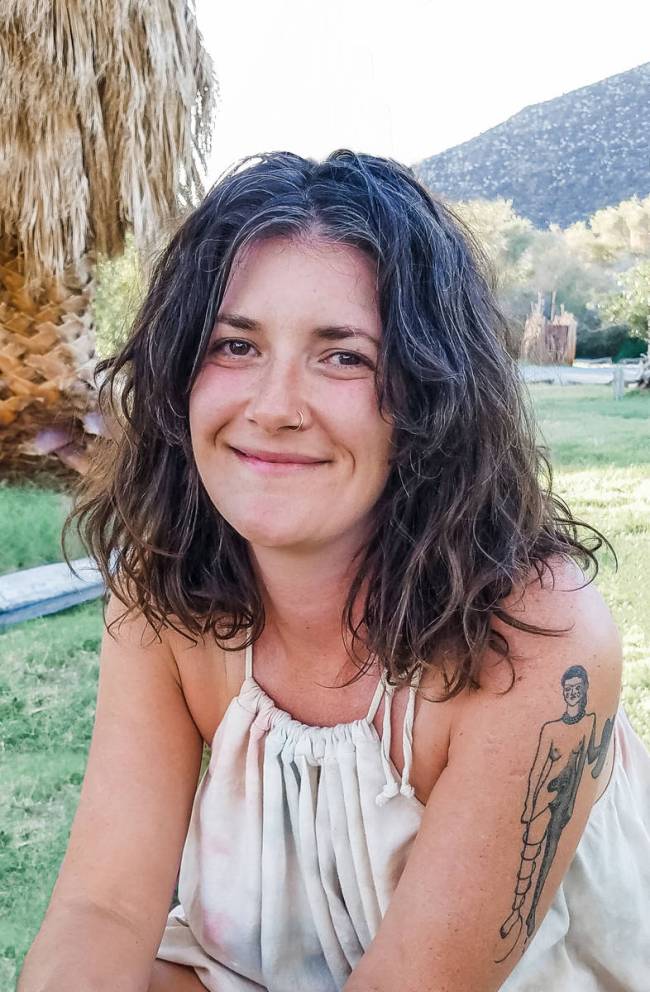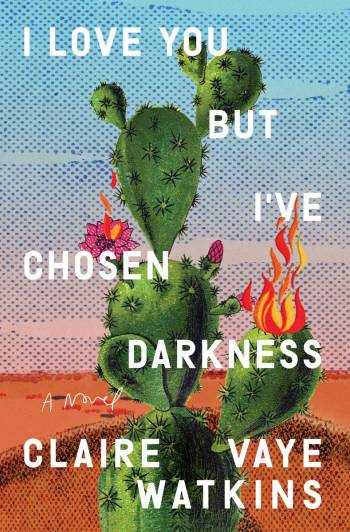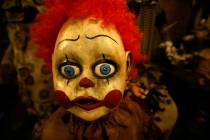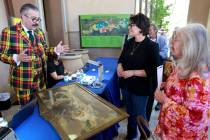Claire Vaye Watkins: A writer made by the Mojave Desert

A few years ago, at the old Writer’s Block bookstore on Fremont Street, author Claire Vaye Watkins read a section from “Tecopa,” her novel in progress. Set in Reno, it was narrated by a woman in the midst of personal upheaval and in flight from her former life. The character’s voice was by turns scabrously funny, self-lacerating, haunted by pain. The audience was bowled over.
Now completed and just published with a fabulous new title — “I Love You but I’ve Chosen Darkness” — it’s about to discombobulate the rest of us, too. A book that defies easy summary, it is, most broadly, the story of a woman in the grip of postpartum depression who flees from her husband and newborn into the Mojave for a reckoning with her, and our, past.

With varying degrees of fidelity to actual events, Watkins has pleated many aspects of her own life into the narrative— for example her father’s intense involvement with the Manson Family (though not their murder spree), and her exit from a failing marriage. The protagonist’s name is Claire, further complicating the “is it autobiography or is it fiction” angle, as if there’s ultimately a difference.
Here’s what the Los Angeles Times says about “Darkness”: “It’s a beautifully arranged tackle box of everything Watkins does best — cut-through-the-bone narrative of family apocalypses; custom blending of the historical, the unimaginable and the impossible; enchanting, terrifying encounters with the American West.”
Watkins first garnered attention in these parts with her debut book, the multiple-award-winning 2012 short story collection “Battleborn,” now routinely found atop on any list of the best books about Las Vegas and Nevada. It was followed by the critical and commercial success of “Gold Fame Citrus,” set in a parched near-future desert Southwest, and a stellar early entry in the now burgeoning field of climate change fiction.
Watkins will read from “Darkness,” again at the Writer’s Block, 519 S. Sixth St., at 7 p.m. October 15. The event is free.
The Mojave is a place saturated by myth and yet as real as it gets. What does that region mean to you as both a person and as a writer?
It’s everything — it’s made me who I am. My stories rise up from this place. Living in the Mojave made the land a central character in my life, and it raised me among fantastic storytellers. It may have warped my sense of realism, made myth more real and reality less. This is a place where valleys used to be seas, where the plants can be thousands of years old, where vigilantes become power brokers and boom towns collapse overnight, and where into the 1990s our own government detonated over a thousand nuclear bombs. I don’t know what can be more surreal than that.
You’ve written about some of the true aspects of your life that show up here as fiction. How complicated was it to modulate how much autobiography, and which episodes, to include?
What I do in my books is pretty much what my parents did in their rock shop: reading the land, observing and describing its offerings, listening to its stories and translating them for people who might not otherwise hear. The goal is deep truth, yet there is a fair amount of BS involved. This novel is a dark comedy disguised as confessional autobiography, yet I felt a serious responsibility to tell the stories of this place without the propaganda impulse that originally occasioned so much writing from the American West, which has been a literature of ulterior motives, used to justify stealing land and genocide. I am trying to tease out the relationships between the land — the creosote, sagebrush, tortoises, mountains, aquifer—and “the American West,” the society laid violently atop that land, without simplifying either. The writing is really just a byproduct from a deeper habit of being, of my efforts to see this place as best I can.
Thinking of the voice of your narrator, with its many modulations — funny, scornful, alert to nuance (“Tecopa is Paiute, after a Paiute chief. A mining company’s way of asking to dig.”) — one imagines it must’ve been fun for you — on a purely writing level — to concoct a character who thinks like that. True?
It was a blast, although it took me a long time to settle into it, to realize I could sound like myself. I still struggle to take up space on the page, and it took many years for the voice to come alive — wry, deadpan, severe, raunchy, honest and (I hope) wise. I wanted to capture this language music I had heard my entire life, on long drives into Vegas for groceries or eavesdropping on my mom’s AA meetings.
Do you see your books as constituting an arc of any sort, or are they discrete responses to the sets of ideas, experiences, feelings, etc. that are most important to you at the time you’re writing?
There is a continuing arc but it may be discernable only to me. The physical terrain is roughly the same, and each book responds to the one that came before. What I fail to do in one book, I try in the next. I’m always writing against the wasteland, in defiance of the idea that the desert is a void awaiting plunder. This novel debunks that lie on a granular and deeply personal level, but each of them, in taking the desert as their muse, are insisting on the aliveness of this place and the beings who live here.
That title — did it come to you in a flash of epiphany or more gradually?
One of my great loves had this phrase tattooed across his collarbones, after a band he liked. It always scared me, and more so after he died at 25. Years later I still missed him, and began an elegy for him by rolling the phrase around, wondering what a person chooses when they choose darkness. By then I’d lost a lot of people, and many of them, it seemed, had also chosen darkness. But what even is darkness? I became consumed by the mysteries of love, choice, and death, and tried to write a book that would bring the dead back.


















